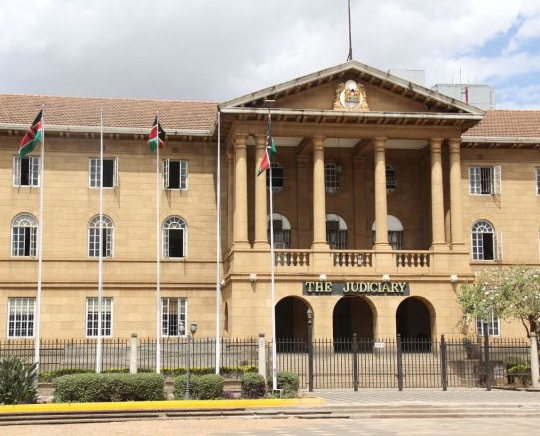Dr Dina N Krigha
Writing in the forward to the book “A Lawyer for our times”, recently retired Chief Justice Dr Willy Mutunga wrote the following about Dr Fackson W. Kagwe: “…it is a meticulously researched account, a compelling story of a fascinating take-charge professional and his equally stirring times.”
This biography reminds me of the “Happy Lawyer”, a book by the writing team of Nancy Levit and Doug Linder, law professors at the University of Missouri, who tackled the crucially important subject of “how to have a happy life in law”.
After interviewing more than two hundred lawyers about what makes them happy in their jobs, Levit and Linder noticed that happy lawyers nearly always talked about doing good work. In a significant way, the book tends to answer the question, “what does it mean to be a good lawyer?” And the famous quip by Justice Potter Stewart about pornography – “I know it when I see it” may seem an appropriate response.
In our times of turmoil and transformation, the legal profession has witnessed lawyers chasing after scarce jobs and firms fighting for limited clients, resulting in serious ethical concerns. And it is pristine clear from the wide array of people interviewed by the author that Kagwe is not given to equivocation and ambiguity. He, for example, castigates a new crop of lawyers “who prey on innocent litigants…” and challenges the LSK to “…heed to the numerous calls by members of the public that all lawyers be vetted with a view to cleaning the Bar, to make it more accountable to the public…”
The biography of Dr Kagwe presents a highly respected conveyancing lawyer, who has made substantial and unique contributions to conveyancing practice in Kenya. It tells the story of a man who has not only done what is good in our society, but has also endeavoured to be guided by a strict code of ethics in doing this good.
The breadth and detail of this work develops themes of personal accountability and professional ethics on a global scale, while remaining true to the life and times of subject. These themes, which emerge from the story, form the impression of a man possessed with a huge appetite for truth and impeccable service to both man and God; one who has dared to uphold the traditional values of justice, equity, honesty, fear of God and the “let not my left hand know what my right hand is doing” sort of philanthropy.
His love for social work is portrayed as legendary, at least among those who know him. His biography depicts his charitable streak as having begun at about 10 years old after his mother died during childbirth, when he assumed the parental role of co-raising his siblings with his grandfather.
With an insightful, accurate and usable index, this biography written by Dr Ng’ang’a Gicumbi is an authoritative, incisive and deeply researched book, which makes for a brisk and lively reading. In telling Kagwe’s story, the creativity of the book hinges on a historical-legal approach that is structurally divided into 18 chapters and ranges over a large amount of territory, addressing numerous issues relevant to modern lawyers.
Looked at from a different angle, his life gives the impression of a man operating on the fringes! His deeply entrenched religious conservatism raises the important question as to what extent religious/theological ethics should eclipse legal ethics in the practice of law; or put another way, is religious ethics necessary in the practice of law?
Importantly, these two forms of ethics do not describe the same subject. While religious ethics examine the kind of person a human becomes and the nature of their moral choices, legal ethics, however is more circumscribed. Its core is in codes and rules; it is also a technical subject in which one learns and focuses on lawyers’ professional standards, which are promulgated in codes or rules that are adopted by Bar associations. So a lawyer need not be a practicing religionist to be considered upright!
In spite of that, “A lawyer for our times” is a book that anyone who is – or was – or wants to be a lawyer (or anyone who knows a lawyer) should read. This book has many uses. It would be an excellent supplemental text for any law school course teaching professionalism such as Professional Responsibility, Clinic or Externship. The book makes a stimulating reading for individual lawyers seeking to improve their own practice in the four areas of legal ethics – truth and deception, professional secrets, conflicts of interests and professional competence.
It also offers a comprehensive analysis into the practice of conveyancing in Kenya, the new Land Act (2012) and emerging challenges surrounding the new land laws. It provides an interesting insight into life in the protectorate during the time of his growing up where, by his own admission, “…the British colonial intruders were loathed intensely…”
The book is also an excellent source of information on land ordinances, the famous Elgon Pledge and communal labour in the reserves, and the loathed office of the chief. It is also an extraordinary resource on some unforgettable anti-colonial crusaders in the House of Commons, who sided with the natives during the British occupation. One such crusader, Arthur Bottomley is reported to have famously quipped: “…the policy that over so long a term of years we have pursued in Kenya has been a complete failure.”
In the end, Dr Kagwe’s biography is an urgent call for society to reconnect with the traditional values of trust, truth-telling, justice, equality, fairness and good workmanship, which are increasingly being lost in the marketplace of greed for money and power that are steadily bearing a heavy human cost on Kenyans, both individually and collectively.
The reviewer is a scholar-in-sabbatical leave in Canada



